
Safety at Home: Respect Electricity
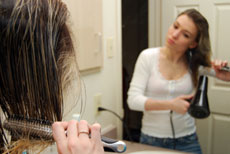 Electricity needs to be respected at all times. Preventing electrical accidents really boils down to HAZARD RECOGNITION.
Electricity needs to be respected at all times. Preventing electrical accidents really boils down to HAZARD RECOGNITION.
Learn how to make your home more safe from electrical hazards and what to do when hazardous situations arise.
ELECTRICAL SAFETY AROUND THE HOME
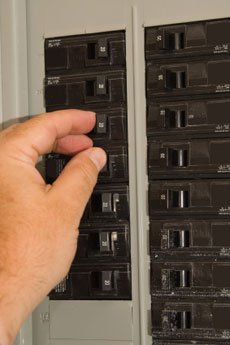 Your home’s breaker panel (or fuse box) protects your house. Use of incorrect fuses and breakers can turn these safeguards into hazards. Use the correct fuses and breakers for the circuits in your home. Size refers to a circuit’s amperage rating. If you don’t know the rating, hire a qualified electrician to identify and label the sizes to be used.
Your home’s breaker panel (or fuse box) protects your house. Use of incorrect fuses and breakers can turn these safeguards into hazards. Use the correct fuses and breakers for the circuits in your home. Size refers to a circuit’s amperage rating. If you don’t know the rating, hire a qualified electrician to identify and label the sizes to be used.
Don’t overload branch circuits by running more appliances than the circuits were designed to handle. Remember: Several outlets are usually connected to one branch circuit!
Check for outlets that have loose-fitting plugs. These may overheat and cause a fire.
Replace broken plates on outlets and switches so there will be no exposed wiring.
Use plastic safety covers on all unused outlets accessible to children.
Don’t force a plug into an outlet if it won’t fit. Plugs should fit securely in outlets.
If an appliance blows a fuse, trips a breaker, or emits sparks or sizzling sounds, disconnect it immediately. Discard the appliance or have it repaired.
Don’t place appliance cords where they will come into contact with heated surfaces like stoves or fireplaces.
Young children are curious and may pull on dangling cords. Protect young children by keeping appliance cords tucked away from counter edges.
When not in use, unplug all non-essential electrical appliances. Even the hair dryer on the bathroom counter has a tiny bit of electricity running through it when it’s plugged in to an outlet.
BATHROOMS, KITCHENS, LAUNDRY ROOMS and WORKROOMS
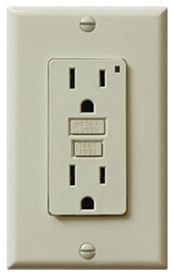 Ground Fault Circuit Interrupters (GFCIs) should be installed in potentially hazardous areas of your home. Locations where water is present, such as bathrooms and kitchens, or where easy ground contact can be made, such as garages, basements and outdoor areas, need GFCIs to protect you. Check your home to see if GFCIs are located in these areas. If you need GFCIs installed, contact a qualified electrician.
Ground Fault Circuit Interrupters (GFCIs) should be installed in potentially hazardous areas of your home. Locations where water is present, such as bathrooms and kitchens, or where easy ground contact can be made, such as garages, basements and outdoor areas, need GFCIs to protect you. Check your home to see if GFCIs are located in these areas. If you need GFCIs installed, contact a qualified electrician.
Even with GFCIs, exercise extreme caution around water when using electrical appliances. Wet floors, sinks, tubs, showers, and toilets are caution areas. An appliance dropped into standing water may energize your home’s entire water system. If you get an appliance wet, unplug it and have it checked by a qualified repair-person.
OUTDOOR HOME SAFETY
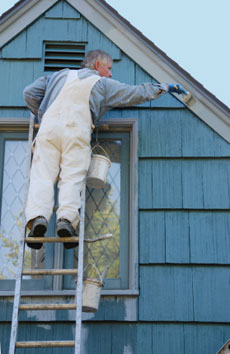 If you see a wire on the ground after a storm, always assume that it is energized. Even if the wire appears to be a telephone or television cable wire, stay away: these wires may have become energized with high voltage if they’ve fallen across power lines.
If you see a wire on the ground after a storm, always assume that it is energized. Even if the wire appears to be a telephone or television cable wire, stay away: these wires may have become energized with high voltage if they’ve fallen across power lines.
Avoid touching metal fences following storms. A live wire can fall across a fence and energize it for some distance.
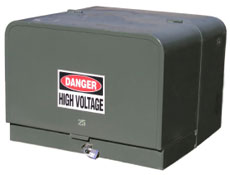 Padmount transformers are used for underground service. The green enclosure around the transformer provides shielding from energized circuits. If the covering becomes damaged or the lock is broken, alert your power company immediately. Don’t plant trees, shrubs, or flowers around padmount transformers: this restricts access to power company crews. You may also contact a buried cable while digging.
Padmount transformers are used for underground service. The green enclosure around the transformer provides shielding from energized circuits. If the covering becomes damaged or the lock is broken, alert your power company immediately. Don’t plant trees, shrubs, or flowers around padmount transformers: this restricts access to power company crews. You may also contact a buried cable while digging.
If you have underground service-or if you’re not sure if you have underground service-call your power company to locate the line before digging anywhere in the yard.
Be careful when working or playing around guy wires supporting utility poles. Don’t swing or climb on them and be careful of running into them with yard equipment or vehicles. Report damaged guy wires to your power company.
Use extreme care around swimming pools. Don’t use electrical appliances near them. Don’t route extension cords in the vicinity. Don’t raise pool maintenance or rescue poles near overhead power lines.
A service drop is the place where wiring enters a building at the meter. Exercise caution when using ladders, painting, pruning, or cleaning near a service drop. The covering on these wires is not insulation, it’s just weatherproofing. This covering can become brittle or cracked, falling off to expose energized wires.
When working outdoors, use only extension cords that are rated for outdoor use.
Be careful not to cut the power cord when working with electrical cutting tools outdoors. These include electric lawn mowers, hedge clippers, chain saws, blowers and trimmers.
Wear sturdy, rubber-soled shoes when working with electrical appliances outdoors. NEVER use electrical tools when barefooted.
Avoid using electrical tools when the ground or lawn is damp or wet.
Do not allow children to climb trees near power lines. Remind them to keep balloons, kites, or even fishing lines away from overhead lines.
Be careful when installing TV antennas that you don’t accidentally come in contact with the service drop wires or overhead power lines.
Have a sailboat? Raising the mast in the vicinity of power lines should be done only with extreme caution. Contact could cause serious injury or death.
Play it safe and smart when you use electricity!
Extension Cord Safety
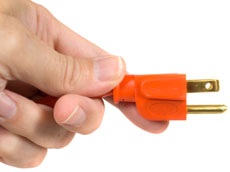 Only use extension cords on a temporary basis, never as a substitute for permanent wiring.
Only use extension cords on a temporary basis, never as a substitute for permanent wiring.
Follow these rules for good extension cord safety.
1. Always keep slack in extension cords. A taut cord can put tension on plugs and receptacles and increase the potential for connections to pull loose.
2. Don’t run extension cords across doorways or other heavy traffic areas unless you securely tape them to the floor first.
3. Avoid activities which might cut the insulation on an extension cord, exposing bare wiring and possibly causing it to overheat.
4. Never unplug an extension cord by pulling on the cord. Always unplug by firmly grasping the plug.
5. Avoid putting extension cords in pinch points such as doors or windows.
6. Don’t staple or nail extension cords to walls.
7. Don’t allow cords to come into contact with oil or other corrosive materials.
8. Before using an extension cord outside or in a wet area, confirm that the cord is rated for OUTDOOR USE. Make sure the cord is connected to a Ground Fault Interrupter Circuit.
